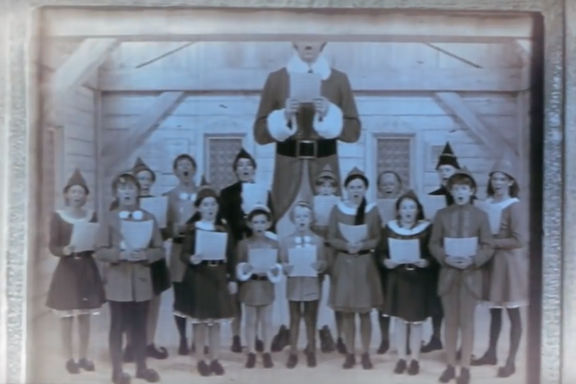10 Ways Expats and TCKs Can Relate to Buddy the Elf
“Buddy passionately loved the North Pole with his whole heart, but he also had compassion for the people of his home culture. He didn’t need to pick between the two because he was part of both of them. He served as a link — an ambassador, if you will. Buddy wasn’t just different, he made a difference.”
I don’t know about you, but I find it very hard to believe that Elf has been around since 2003. It quickly became one of the Christmas movie classics — right up there with Home Alone, The Santa Claus, and It’s a Wonderful Life. I know I don’t need to convince you to watch that movie (as if you haven’t watched it more than a few times this month alone). But, like any movie that’s watched over and over again because it never gets old, I began to pick up on details I didn’t notice the first two dozen times.
This year, as I sat and watched Elf with my children, I couldn’t help but relate to Buddy on a whole new level. Why was I feeling so seen and understood by this movie? Then it hit me — Buddy is an expat. Even more than that, Buddy is an adult Third Culture Kid. And while I’m not a TCK myself, I’m raising four of them and could see a bit of them in Buddy.
He even has to deal with the questions that have complicated answers. “I’m an elf,” Buddy says matter-of-factly. He then goes on to clarify, “well, technically, I’m a human, but I was raised by elves.”
He acknowledges he’s from the U.S., but he isn’t familiar with it. However, Buddy is also acutely aware he doesn’t fit in completely in the North Pole either. As I continued watching the movie through the lens of an expat, I couldn’t help but take note of many more similarities. Just when I didn’t think I could love the movie more, I found ten ways expats and TCKs can relate to Buddy the elf.
1. Trying to explain where you live can sound very magical. In your mind, as you explain where you live, some things have become new normals. Maybe you see the Eiffel Tower on a regular basis. Or it could be that you see giraffes or elephants on the side of the road. Since the initial excitement of those things has worn off a bit, you don’t realize that, to your listener, you sound like you’re saying, "I passed through the seven levels of the Candy Cane forest, through the sea of swirly-twirly gum drops, …”
“Wow, your life must be so exciting,” they say. It’s true — we have the occasional “pinch me” moments of not believing this is really our life. But also, there are some very irritating days that can feel less like “exciting” and more like “annoying.”
2. When you’re back in your home country, you’re passionate about clarifying the stereotypes and misconceptions of your host country.
“No, they aren’t all terrorists.”
”No, General Tso chicken is not authentic Chinese food.”
”No, I can’t speak African. Africa is not a country — many countries make up the continent of Africa.”
”Actually, Bali is a part of a country, not its own country.”
”Oh, I think you’re thinking of India, not Indonesia.”
”Oh, you might be thinking of Maui, not Malawi.”
”I’m telling you, the croissants in France are in a whole different league.”
3. You might know the literal meaning of individual words, but the meaning of those words strung together might get lost in translation. At face value, the phrase seems pretty easy to understand. But, as we sometimes find out the embarrassing way, words and phrases can change depending on their context. Idioms, sarcasm, added body language, subtle eyebrow/nose/lip movements — it’s another layer of learning how to communicate with others. The good thing about embarrassing yourself in these cultural moments is you usually NEVER make that same mistake twice.
4. You’re willing to try the local delicacies, even if you’re 99.9% sure it’s not going to be your favorite. It’s hard to say no to someone who is really excited about you trying one of their local favorites. Fruit that smells like a gym sock? Bon appétit! Hot tea mixed with a raw egg? Bottoms up!
5. From time to time, you gorge yourself on comfort food. The funny thing about comfort food is you never know what it is until you don’t have it anymore. Then, when you find it, you inhale it in 2.5 seconds. Maybe you never considered a hamburger your favorite dish. But in your host country, seeing the glow of the golden arches might as well be a light shining from heaven when cultural stress is getting the best of you.
6. You get excited about nice restrooms. Oooh, it’s not a squatty. Look, there’s toilet paper and the floor isn’t wet. Oh wow, there’s a hook to hang my bag. Is that hand soap I see??
7. You feel like you’re the same size as everyone else, and then you see yourself in pictures and remember: you are a giant. Some of you live in cultures where commenting on body size is just as common as chatting about the weather. “Yes, I did gain weight. Thank you for noticing.” Others of you quietly live your lives, feeling the same size as everyone else, and then you take a group photo. Do I really tower over everyone like that?
8. It’s likely you’ve acquired a skill or two since living in another country. Whether it’s becoming fluent in another language, being really good at bargaining for a good price, or knowing how to drive a stick shift up steep hills — you’ve definitely added some noteworthy things to your life skills achievements. These things don’t really come up in conversation, though — and bringing them up kind of seems like you’re bragging. But when that skill set is needed, you nonchalantly bust it out and wow the crowd. Maybe you’re showing off a little bit, but some things take a long time to learn and, by golly, it’s ok to be proud of it!
9. All we need is to find one friend who shoots straight with us and who is willing to answer all of our questions. We need that safe person who isn’t going to let us keep embarrassing ourselves. It’s the friend who corrects your language and cultural mistakes, and also doesn’t let you have a pity party for too long. It’s the person who is patient enough to stick with you, despite all you have left to learn. Basically, we all need a friend like Leon the Snowman.
10. You’re always going to feel different, even when you look like everyone else. Looking and sounding like a foreigner might have been something you were prepared for when you moved to your host country. However, when you find yourself back in your home country — where you blend in and know the culture — you still find yourself not quite fitting in with everyone else. New news to you is old news to everyone else. You accidentally shake someone’s hand like you would in your host culture, or kick off your shoes at the door. You let a word from another language slip from your mouth or you completely forget a word in your own language. You have a thousand stories you want to share from another place you call home, but no one is really asking. You still feel like a foreigner who’s dressed up as a citizen.
Then, just when you think you’re always going to be the oddball, you find a way to plug in. Just when you think your life of many cultures has ruined everything, you realize your multicultural life has shaped you to be a better person than you were before.
Buddy passionately loved the North Pole with his whole heart, but he also had compassion for the people of his home culture. He didn’t need to pick between the two because he was part of both of them. He served as a link — an ambassador, if you will. Buddy wasn’t just different, he made a difference.
If we can learn anything from Buddy, it’s this: the things that make us different are the things we don’t need to hide. When you find yourself having to give complicated explanations of your life, say it loud, say it proud — or sing it loud for all to hear.
Have you seen the movie Elf? What other similarities can you find? Share those with us in the comments. If you haven’t seen the movie yet, it’s not too late!
Do you have language learning goals for the new year? The One Word at a Time Language Learning Notebook is great for goal setting, planning, and keeping your notes organized.













